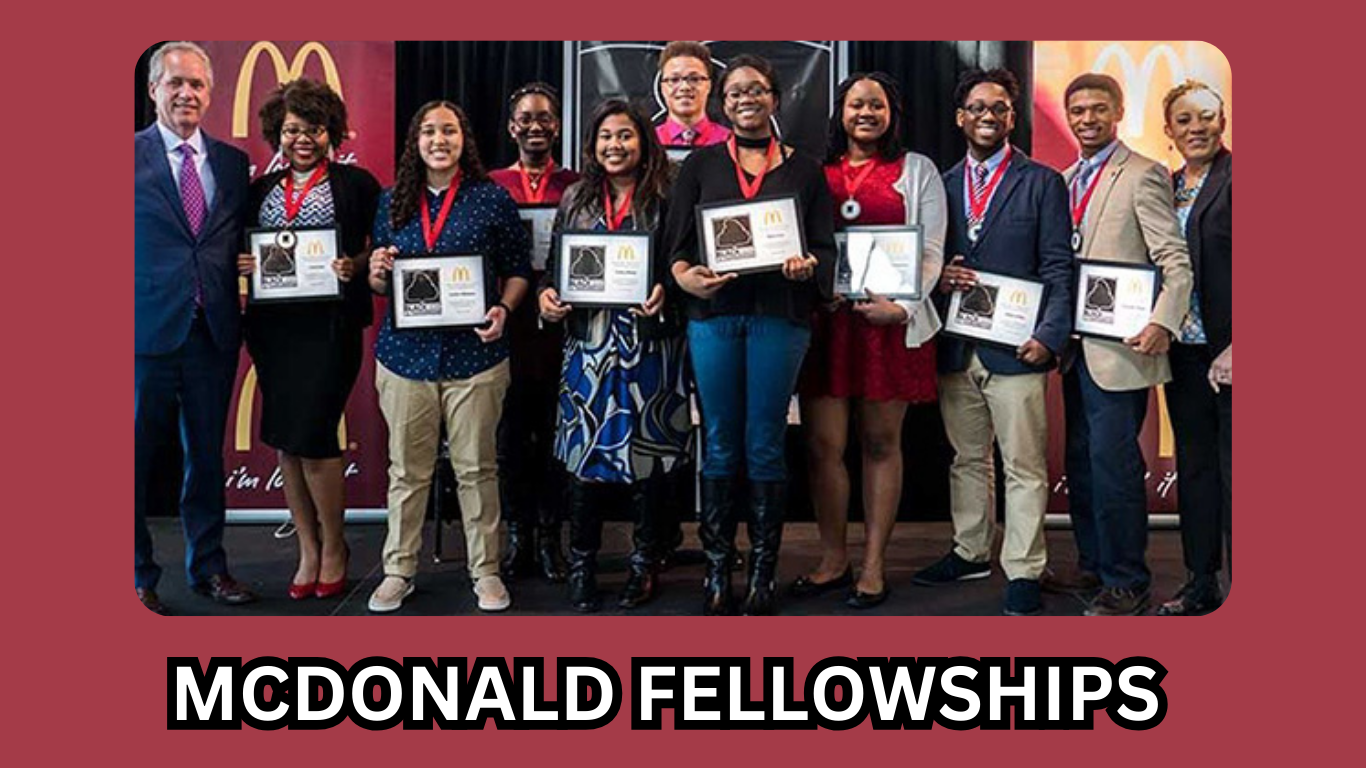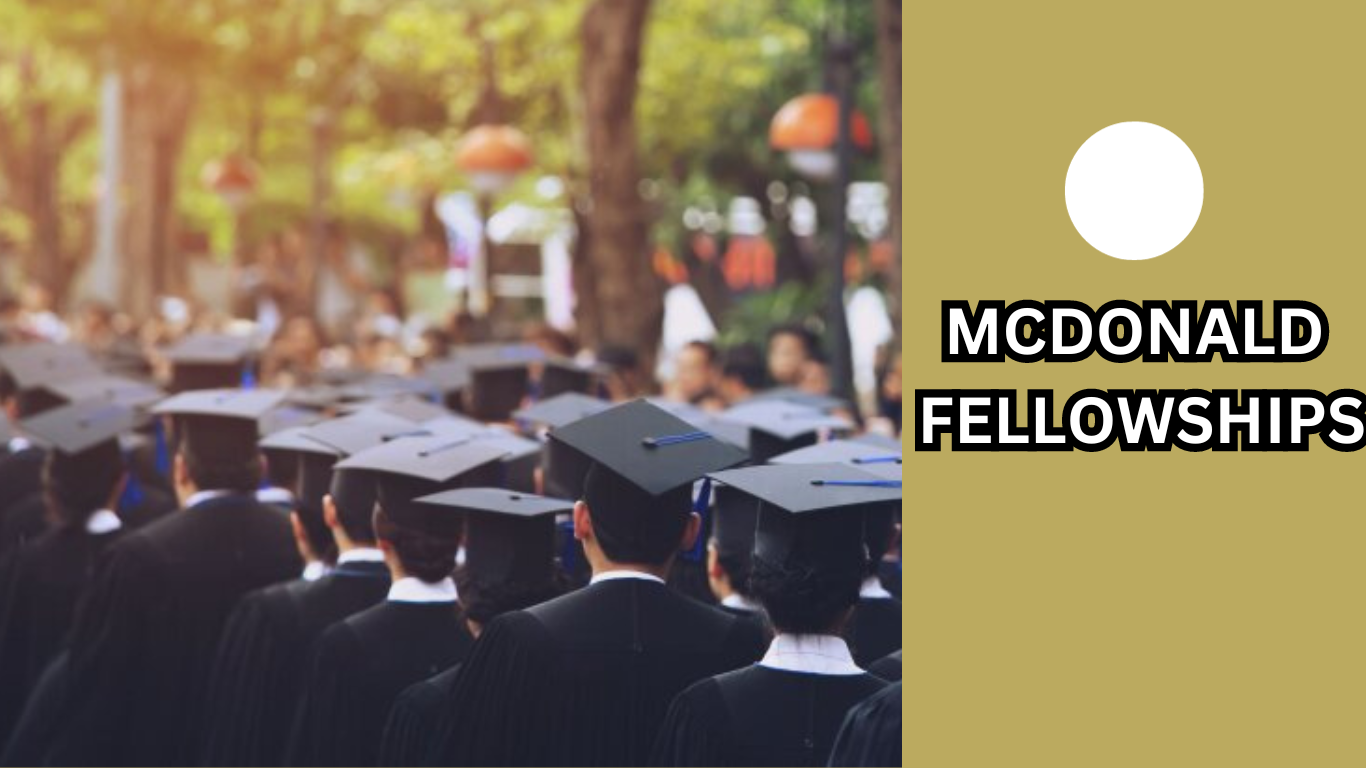McDonald Fellowships 2024, International students can apply for fully financed scholarships through the McDonald Fellowships 2024–2025. These fellowships are offered for doctoral and master’s degrees. The fellowship comprises of a two-year award (about £30,000 GBP annually) to cover living and travel expenses, plus an extra £2,000 GBP annually to the host university.
Early-career multiple sclerosis researchers from low- and middle-income nations can work at a research institution outside of their home nation thanks to the McDonald Fellowship.
We anticipate that recipients of the prize will be able to continue their MS research and/or patient treatment in low- and middle-income nations by utilising their newly acquired networks and experience.

Synopsis of Scholarship
Study Level: Masters, PhD School(s): McDonald
Study in: The participant’s own country or a neighbouring one
Chance Areas of Focus: Multiple Illnesses
Duration of Programme: Two Years
June 30, 2024 is the deadline (already closed).
Coverage of Scholarships
The recipient of a McDonald Fellowship will gain the following advantages:
The annual living and travel expenses of a fellow will be paid for with £30,000 GBP.
The fellow’s institute is going to get £2,000 GBP.
Qualifications regarding McDonald Fellowships
For a candidate to be eligible for a McDonald Fellowship, they must meet each of the standards listed below:
Language(s) Needed: English
International students from low-income or middle-income nations are eligible.
The minimum requirement for a candidate is a Master’s, PhD, or MD student.
A candidate may also be qualified if they are conducting research on multiple sclerosis in a low- or middle-income nation abroad.
Since the application will be submitted jointly by the applicant and the host institute, the candidate must first choose the host institute, which may be in their own nation or a neighbouring one if travel is permitted.
Working or attending school in a low- or middle-income nation (defined as any nation with a low, lower middle, or upper middle income at the time of nomination) by the World Bank
Working on a project that began within the six months prior to nomination while studying or working abroad
studying abroad for a project funded by a grant from the MS International Federation
How to Make a McDonald Fellowship Application
For McDonald Fellowship applications, kindly adhere to the following instructions:
Fill out the online application form in its entirety.
*A supporting statement from the host must be included at the conclusion of the application.
Provide the names and contact information for three references, preferably the applicant’s present employer or supervisor.
Request that references provide their letters of recommendation to research {at}msif{dot}org before the deadline.
In February 2024, applications for the McDonald Fellowships will be accepted.
Please read the details below if you would like to apply in 2024.
The McDonald Fellowship: What is it?
Early-career multiple sclerosis researchers from low- and middle-income nations can work at a research institution outside of their home nation thanks to the McDonald Fellowship. Participants either pick up new skills or complete portions of collaborative research projects during the visit.
We anticipate that recipients of the prize will be able to continue their MS research and/or patient treatment in low- and middle-income nations by utilising their newly acquired networks and experience.
The fellowship includes a two-year grant (about £30,000 GBP year) to cover living and travel expenses, as well as a supplementary £2,000 GBP annual contribution.
In collaboration with ARSEP, The Fondation pour l’Aide à la Recherche sur la Sclérose En Plaques, a member of MSIF, another fellowship is given out. The MSIF-ARSEP McDonald Fellowship is the name of this programme.

Who is qualified?
Every applicant needs to:
possess a postgraduate degree in a field related to multiple sclerosis (at least an MSc, ideally a PhD or MD).
possess citizenship in a nation with a low or middle income (all nations having a low, lower middle or
upper medium income as defined by the World Bank)* Focus their study in an area related to multiple sclerosis.
Moreover, candidates need to be in one of the following circumstances:
Working or studying in a low- or middle-income nation (all countries with a low, lower middle or upper middle income as defined by the World Bank) at the time of application.
working on a project that began within the six months prior to application while studying or working abroad.
studying overseas as part of an MSIF-supported Du Pré grant initiative.
An individual who has held a Du Pré grant in the past may apply for a McDonald Fellowship in the future, but not the other way around.
It is anticipated that candidates will return to their home nations at the assist in improving MS research and care.
In the event that a candidate has been accepted into a PhD programme at a reputable institution (within the six months of applying), but their financing is insufficient to pay the entire cost, they may also use the McDonald fellowship to partially fund the programme.
The terms and conditions of the award (see below) must be read and signed by candidates and host supervisors.
The McDonald Fellowship is expected to begin within a year of receiving funds.
Please use the “Research grants and awards” option on the contact us form to get in touch with our research team for additional details.
Note that the applicant and host are submitting this application jointly. Prior to applying, individuals must find an appropriate project and host supervisor at an institution outside of their home country. A project host must be agreed upon before beginning the application. The application deadline for the host statement is June 30, 2024. How to apply: Determine your project and area of interest. Get in touch with your host, who is likely a lab or clinic project supervisor. Fill out all the sections of the online application form. After submitting, the applicant contacts the host to submit a supporting statement using the same application form. The applicant requests that the three referees send their letters of recommendation to research{at}msif{dot}org well in advance of the June deadline.

How to fill out an application
Decide on your project and interest area.
Make contact with your host (the project supervisor in a lab or clinic) and work out a project proposal together.
The applicant fills out the online application form in its entirety.
The host is requested to submit a supporting statement using the same application form once the applicant submits.
The applicant requests that the three referees submit their letters of recommendation to research\at}msif{dot}org by June 30 at the latest.
In order to comprehend the guidelines for reporting and payments, applicants must read the Award’s Terms and Conditions.
The application’s lay summary is something that applicants should carefully read. At the bottom of this page is some advice on how to construct a lay summary.
*Filling out the host supporting statement occurs after the applicant has sent in their application. After that, the suggested host will receive an email with instructions to complete the application form’s supporting statement solely via text. You have to finish this before the deadline.
When is the deadline?
The online application form, letters of recommendation, and host statement supporting it are all due by June 30, 2024.
You have to give the prospective host enough time to review your application and offer a statement of support before submitting it. It is recommended that you let your host at least two weeks to finish this. Likewise, you need to request that your references submit a letter of recommendation to research{at}msif{dot}org prior to the deadline. If the host statement and references are not received by June 30th, applications will be rejected.
The application deadline is June 30.
The host supporting statement deadline is June 30.
Reference deadline: June 30.
In October, applicants will receive word on their status.
How are Fellowships awarded?
The McDonald Fellowship panel of MSIF, which consists of scientists and MS patients, evaluates and chooses the winners.
What proof of outcomes is required?
The fellowship requires that a brief report be turned in at the conclusion of the first year. Funding for the second year is contingent upon this report’s submission. Following the fellowship, a final report and an itemised list of expenses must be submitted. It is also necessary to submit electronic versions of any reports, articles, abstracts, and posters that came from the visit. Research sponsored by the McDonald Fellowship should be acknowledged in papers created as a result of or in connection with the fellowship.
Please include www.msif.org, the URL of the MS International Federation website. Who should I get in touch with? Please use the “Research grants and awards” option on the contact us form to reach out to our research team for more details, including help in locating potential host institutions. assistance from organisations We will always be indebted to ECTRIMS and ARSEP, our partner organisations. These honours could not have been made possible without their assistance. Here is more information on ECTRIMS: ECTRIMS Here is more information on ARSEP: ARSEP Conditions & Terms Both the Award holder and the Host supervisor must concur and sign the Terms and Conditions of the Award. Here are the McDonald’s terms and conditions. Lay Synopsis The 500 words is a crucial part of the application.

Provide some background information and introduce your study topic at the beginning of your lay summary. Describe the topic of your research and its significance. Next, describe the precise issue that your research project seeks to resolve—for example, a gap in the literature, a dispute in science, etc. Finally, briefly describe the implications of your research for MS patients.
Speak plainly: When describing your research idea, use basic, everyday language. Steer clear of employing complex terms and expressions that could be hard for a 12-year-old to comprehend. Certain terms, such “demyelination,” “myelin,” and “remyelination,” are uncommon and need to be defined.
Give specific examples: Give specific instances to support your research suggestion. This will make it easier for the reader to understand the research proposal.
Make use of analogies Make use of analogies to clarify complex ideas. The brain and nerves, for instance, resemble a computer’s wiring, which is protected by myelin, the plastic covering that surrounds electrical connections.
Explain technical jargon: Make sure to define any technical terms you employ in plain English.
Keep things brief and straightforward: Use all 500 words, but don’t stray from the main ideas or go into excessive detail. Make an effort to get the big picture.
Try it out: Make sure your summary is understandable to a non-MS educated friend, family member, or co-worker before sending it in. If not, make changes until the summary is understandable and unambiguous.
Please do not hesitate to Before submitting, send the lay summary to the MSIF research team. The application form contains the contact information. How are Fellowships awarded? The McDonald Fellowship panel of MSIF, which consists of scientists and MS patients, evaluates and chooses the winners. What proof of outcomes is required?

The fellowship requires that a brief report be turned in at the conclusion of the first year. Funding for the second year is contingent upon this report’s submission. Following the fellowship, a final report and an itemised list of expenses must be submitted. It is also necessary to submit electronic versions of any reports, articles, abstracts, and posters that came from the visit.
Research sponsored by the McDonald Fellowship should be acknowledged in papers generated as a result of or in connection with it. The website address of the MS International Federation is www.msif.org. Who should I get in touch with? For additional details, including help locating potential host universities, please get in touch our research team by choosing “Research grants and awards” on the contact us form. assistance from organisations We will always be indebted to ECTRIMS and ARSEP, our partner organisations. These honours could not have been made possible without their assistance. Here is more information on ECTRIMS: ECTRIMS Here is more information on ARSEP: ARSEP
Conditions & Terms Both the Award holder and the Host supervisor must concur and sign the Terms and Conditions of the Award. Here are the McDonald’s terms and conditions. Lay Synopsis The application’s 500-word lay summary is a crucial part. Provide some background information and introduce your study topic at the beginning of your lay summary. Describe the topic of your research and its significance.
Next, describe the precise issue that your research project seeks to resolve—for example, a gap in the literature, a dispute in science, etc. Finally, briefly describe the implications of your research for MS patients.
Speak plainly: When describing your research idea, use basic, everyday language. Steer clear of employing complex terms and expressions that could be hard for a 12-year-old to comprehend. Certain terms, such “demyelination,” “myelin,” and “remyelination,” are uncommon and need to be defined.
Give specific examples: Give specific instances to support your research suggestion. This will make it easier for the reader to understand the research proposal.
Make use of analogies Make use of analogies to clarify complex ideas. The brain and nerves, for instance, are like a computer with cables that are covered with plastic called myelin.
Next, describe the precise issue that your research project seeks to address, such as the gapwrapping of electrical cables.
Explain technical jargon: Make sure to define any technical terms you employ in plain English.
Keep things brief and straightforward: Use all 500 words, but don’t stray from the main ideas or go into excessive detail. Make an effort to get the big picture.
Try it out: Make sure your summary is understandable to a non-MS educated friend, family member, or coworker before sending it in. If not, make changes until the summary is understandable and unambiguous.
Before submitting, feel free to provide the MSIF research team with a short synopsis. Contact information can be found inside the application form.

